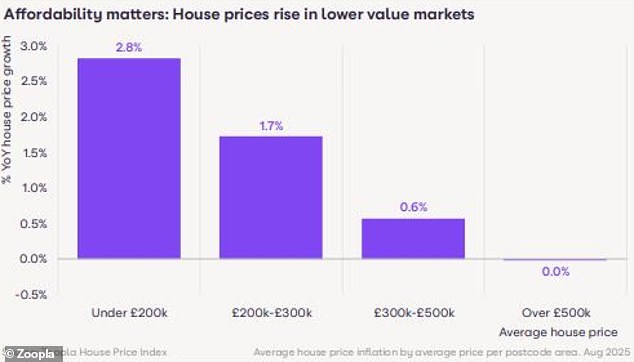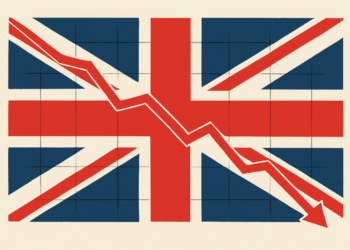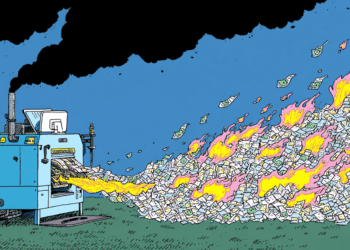Labour’s languishing over the Autumn Budget is hitting the upper echelons of the property market hard, new data shows.
While the Government talks up the need to create growth in the economy, figures from Zoopla reveal the stark impact concerns over potential new property taxes are having on the housing market.
Last week, property expert Kirstie Allsopp warned the property market was ‘dead’ amid paralysis ahead of the Budget.
Zoopla data shows pre-Budget speculation has triggered a 4 per cent drop in buyer demand for homes listed for £500,000 or more, compared with the same period last year.
The reality for the prime property market is even worse. In the past five weeks, buyer demand for homes priced at £1million or more is down 11 per cent compared to the same point a year ago.
As a result, the top 5 to 10 per cent of the market is feeling the brunt, according to separate figures from Savills.
It says prime central London property prices have fallen 1.8 per cent over the past three months – the biggest drop since December 2016 – meaning they are down 4.7 per cent year-on-year.
Meanwhile, the prime part of the country house market are even more affected, with annual falls of 8.1 per cent.
Riz Malik, a director at R3 Wealth told the Daily Mail via Newspage: ‘The stock is there but buyers are holding back until Rachel Reeves unveils her ransom note in the autumn, or rather winter, Budget.
‘Talk of mansion taxes and a potential property tax replacing stamp duty land tax is paralysing confidence. The market hates uncertainty and right now it’s drowning in it.’
Property price inflation is weakening in the south of England, where house prices are typically higher, Zoopla said.
With both buyers and sellers pausing for thought at the higher end of the market, new listings for homes above the £500,000 mark have also fallen in recent weeks, when compared to last year.
Reports of policy papers last month have indicated sweeping changes to the property tax system could be on the cards in the Autumn Budget on November 26.
Proposals reportedly ranged from abolishing stamp duty and replacing it with an annual property tax on homes sold above £500,000, to a council tax revaluation, and even taxing capital gains on sales above £1.5million.
Zoopla said: ‘None of these ideas came directly from the Government, but they are presented as “options ministers are considering”, which has been enough to unsettle parts of the market.’
One conveyancing expert in London told the Daily Mail he had recently seen buyers pull out of £1million-plus purchases.
Chris Barry, a director at Thomas Legal in London, told the Daily Mail via Newspage: ‘We have seen a worrying uptick in the number of buyers above £1million who are deciding to withdraw from their purchase using negative press surrounding the upcoming budget as their excuse not to commit.’
Sellers are also holding back ahead of the Autumn Budget on November 26.
According to Zoopla’s analysis, there are 9 per cent fewer £1million-plus homes listed for sale than a year ago, and 7 per cent fewer £500,000-plus properties.
In contrast, demand and new supply across the rest of the market ‘remain in line with last year’, Zoopla said, adding that Autumn Budget speculation was having less of an impact across the wider mainstream market.
Zoopla added: ‘London and the South East have the most homes for sale over £500,000, which is where the impact of this speculation on market activity will be felt more strongly in the coming weeks.’
One in three homes currently for sale is priced above £500,000, while eight per cent at £1million or more.
Kundan Bhaduri, an entrepreneur and landlord at The Kushman Group, said: ‘Demand for £500,000-plus houses has evaporated because potential purchasers refuse to commit substantial capital when the Chancellor might unveil punitive measures targeting higher value homes through council tax revaluations, annual property taxes, or enhanced stamp duty rates.
‘Meanwhile, vendors are withdrawing listings rather than accept reduced prices in a market paralysed by fiscal uncertainty.
‘The speculation around property tax reforms has created a perfect storm of transaction paralysis in the prime market segments.’
Kevin Shaw, national sales managing director at LRG, said: ‘The housing market has shifted in favour of buyers, with sellers increasingly willing to align with agents’ valuations and to negotiate on price.
‘That balance is welcome for many purchasers, particularly first time buyers who appear undeterred by April’s increase in Stamp Duty and have benefitted from lower interest rates.’
He added: ‘At the upper end of the market, speculation over property tax has created hesitation. The prospect of a so-called mansion tax, combined with wider fiscal uncertainty, has dented sentiment and slowed decision-making somewhat.’
What is happening to house prices?
Zoopla’s latest House Price Index showed house price inflation slowing in recent months, potentially sparking pockets of opportunity for some buyers.
Last month, property price inflation stood at 1.4 per cent, against 1.9 per cent recorded in December 2024.
The average cost of a home is £271,000, an increase of £4,350 over the last year, Zoopla said.
House prices are rising fastest in markets where average prices are below £200,000. In contrast, local markets with average house prices above £500,000 are experiencing ‘static prices’, Zoopla said.
In London, the South East, South Eest, and East of England, higher stamp duty costs and affordability constraints are putting a damper on price growth, with these regions seeing the lowest growth in the country, at less than 0.5 per cent.

What can you afford? House prices in more affordable markets are rising faster
However, more affordable locations are seeing strong property price growth.
Northern Ireland led the way with a significant 7.9 per cent increase last month, while the north west saw prices jump 3.1 per cent.
Average mortgage rates for a new five-year fixed-rate deal are currently between four per cent and five per cent, Zoopla said.
It added: ‘Homebuyers can now afford to borrow 20 per cent more than they could six months ago for the same income. These adjustments have been a key driver of housing demand in recent months, particularly among first-time buyers and those in more affordable regions.’
On average, estate agents have 36 homes for sale, a 20 per cent increase from 2023 and an eight per cent rise year-on-year, Zoopla said.
Data from the Office for National Statistics this month showed average property prices across Britain rose by 2.8 per cent to £270,000 in the year to July, down from 3.6 per cent in the 12 months to June.
Rob Mansfield, an independent financial adviser at Rootes Wealth Management in Tonbridge, told the Daily Mail via Newspage: ‘We may be seeing house prices reaching a ceiling at this level as affordability becomes too stretched.
‘The Autumn Budget speculation around new property taxes doesn’t help, especially as we don’t know what the Chancellor will actually do. This lack of confidence could make this a quieter winter than usual for property sales.’
Have you pulled out of a property purchase or put the brakes on selling? Get in touch: editor@thisismoney.co.uk











